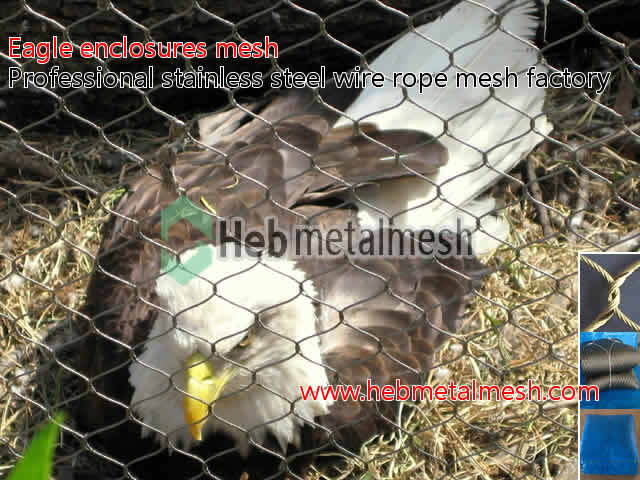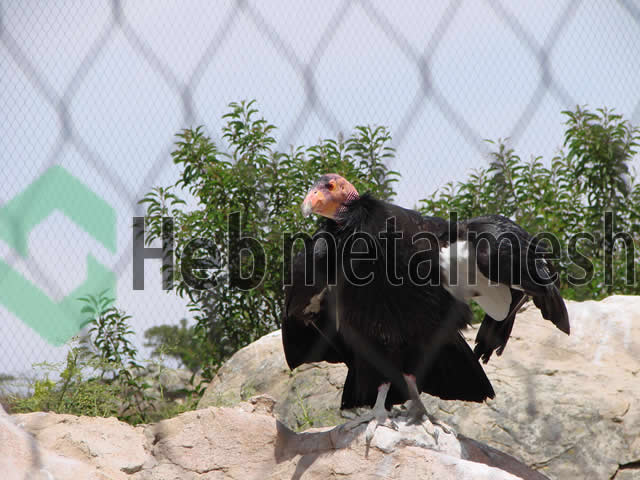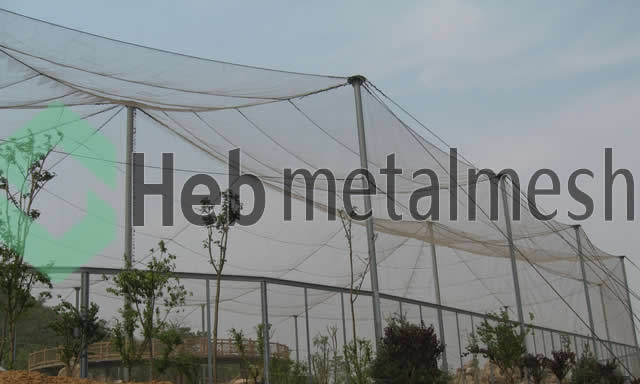Introduction to Bird Cage Wire
When selecting a bird cage, the choice of wire is paramount for ensuring the safety and comfort of your feathered companions. Birds are naturally curious and active animals, often engaging in behaviors that can lead to injury if not properly housed. The wire used in bird cages serves as the primary barrier between your pet and potential hazards. Therefore, understanding the importance of using the right wire for bird cages is essential for any bird owner.
The safety of pet birds directly correlates with the quality and type of wire used in their cages. Low-quality or inappropriate wire can pose significant risks, such as the likelihood of escape, injury from sharp edges, or even exposure to toxic materials. For instance, galvanized wire might appear to be a cost-effective option; however, it can be coated with zinc that is hazardous to bird health. Selecting appropriate materials that are safe for your birds is crucial for long-term care.
In addition to safety, the comfort of birds within their cages is vital for their well-being. The choice of wire gauge plays a substantial role in this aspect. A wire that is too thin may bend or break under pressure, potentially collapsing and causing accidents. Conversely, wire that is excessively thick may inhibit the birds’ ability to perch comfortably. Furthermore, the spacing between wire strands is important; larger birds such as parrots require wider spacing to avoid getting stuck, while smaller birds need narrower gaps to prevent escape.
Lastly, the overall durability of the cage hinges on the wire used. Cages are subject to wear and tear, especially in busy households where birds engage in chewing or climbing. Selecting resistant materials ensures that the structure remains intact over time, minimizing the need for replacements. Understanding these factors is vital as we begin to explore the various types of wire suitable for bird cages.
Understanding Wire Gauge: What You Need to Know
When selecting wire for bird cages, understanding wire gauge is crucial to ensure the safety and comfort of your avian companions. Wire gauge refers to the thickness of the wire, with a lower gauge number indicating thicker wire. The wire’s strength, durability, and potential hazards for birds are all influenced by its gauge, making this a vital factor in your decision-making process.
Bird cages come in various designs and materials, but the gauge of the wire significantly impacts the structural integrity and security of the habitat you create for your pets. Common wire gauges for bird cages range from 10 to 18 gauge. Thicker wires, such as 10 or 12 gauge, are typically recommended for larger birds like parrots or macaws, as these species possess considerable strength and beak power. Conversely, for smaller birds, such as finches or canaries, thinner wire like 16 or 18 gauge may be sufficient. However, it is essential to balance the gauge with the specific needs and behaviors of the bird species, as thinner wires can be more easily bent or damaged, leading to potential escapes or harm.
Moreover, consider the gap between the wires, which is just as important as the gauge itself. For example, a cage for a small parakeet should have a wire spacing of no more than half an inch to prevent curious birds from slipping out or getting caught. Using the correct wire gauge not only ensures structural safety but also protects your birds from potential predators or environmental hazards.
In the quest to construct the ideal bird enclosure, prioritizing the right wire gauge tailored to your birds’ needs cannot be overstated. Taking the time to research and choose appropriately will result in a safer and happier environment for your feathered family members.
Types of Wire Suitable for Aviaries
When it comes to building a secure and comfortable environment for pet birds, the choice of wire is crucial. Various types of wire for bird cages are available, each possessing distinct characteristics that may influence their suitability for aviaries. Galvanized steel wire is one of the most commonly used materials due to its affordability and good resistance to corrosion. Its protective zinc coating acts as a barrier against rust, making it a popular choice for outdoor aviaries. However, over time, this coating can wear off, and if the wire is damaged, it can potentially rust, compromising the strength of the cage.
Another excellent option is stainless steel wire. Known for its durability and rust resistance, stainless steel is less prone to wear and tear compared to galvanized wire. This makes it a long-lasting choice for aviaries, especially in humid environments. While stainless steel is generally more expensive than other wire types, many bird owners consider it a worthwhile investment for the longevity and safety it provides. Moreover, stainless steel is very easy to clean, making maintenance simple and efficient.
PVC-coated wire is another alternative that offers a unique combination of safety and aesthetics. The plastic coating provides an extra layer of protection against rust and sharp edges, reducing the risk of injury to birds. However, it is essential to ensure that the PVC used is bird-safe, as some coatings may contain harmful chemicals. Additionally, while PVC-coated wire may be visually appealing, it might not hold up as well under harsh weather conditions as metal alternatives.
Each type of wire has its pros and cons, and selecting the right one is vital for constructing a safe and durable aviary. Considering factors such as the local climate, maintenance requirements, and the specific needs of the birds will help in choosing the appropriate wire for bird cages.
Where to Buy Bird Cage Wire Panels
Finding the right wire for bird cages is crucial for ensuring the safety and well-being of your avian companions. Various options exist for purchasing wire panels, both online and in physical stores. Reputable online retailers such as Amazon, Chewy, and specialized pet supply websites offer a wide variety of wire panels suitable for bird cages. These platforms provide extensive product descriptions and customer reviews, enabling potential buyers to make informed decisions based on quality and safety.
Local pet supply stores often carry a selection of bird cage wire panels as well, allowing customers to physically inspect the product before purchasing. It is essential to choose a store that specializes in bird care to ensure the materials comply with safety standards. Chain pet store brands like PetSmart and Petco typically stock reliable products along with knowledgeable staff who can assist with any questions regarding the roll or panel size needed.
When shopping for wire for bird cages, several criteria should be considered to ensure quality and safety. First, the gauge of the wire is an important factor; a thicker gauge (lower number) offers improved durability and resistance against potential chewing by birds. The spacing of the bars also needs to be examined, with smaller gaps preventing escapes or injuries to your pet. Moreover, avoid any painted or coated wire, as toxic materials can pose health risks if ingested.
Additionally, exploring local artisan shops or manufacturers that specialize in custom wire work can offer a unique solution tailored to specific cage designs or sizes. In conclusion, whether online or in local stores, ensure that the wire panels purchased for bird cages prioritize safety and durability for an effective living environment for your feathered friends.
Bird Cage Wire Mesh Price Comparison
When selecting wire for bird cages, understanding price variations across different types and suppliers is crucial for making cost-effective choices. Several factors significantly influence the pricing of bird cage wire mesh, notably the material type, wire gauge, and the purchasing location. Common materials for bird cage wire include stainless steel, coated wire, and galvanized options, each presenting distinct price points.
Stainless steel wire is typically the most expensive option, due to its durability, resistance to rust, and overall longevity. It offers excellent protection for birds, making it a worthwhile investment for long-term use. Coated wire, which is often less expensive than stainless steel, provides additional safety features, such as protection against corrosion and the risk of injuring the birds. However, the coating may wear off over time, potentially leading to wear issues. Galvanized wire serves as a budget-friendly alternative; it is coated with zinc to protect against rust, but its lifespan is generally shorter than that of stainless steel or coated wire.
Wire gauge is another significant factor affecting prices. Thicker wire gauges (lower numbers) provide more strength and durability but often come at higher costs. Conversely, thinner wire gauges (higher numbers) are less expensive but may not provide adequate safety for larger or more active birds. Therefore, when comparing prices, it is essential to consider the appropriate gauge for the type of birds you intend to house.
Lastly, to find the best deals on bird cage wire mesh, it is advisable to shop around and compare quotes from multiple suppliers. Online retailers, local pet stores, and specialty bird supply companies may offer varying prices and shipping rates. Taking time to evaluate these options can assist you in acquiring quality wire for your bird cages while adhering to your financial constraints.
Finding Wire for Bird Cage Nearby
When it comes to constructing or repairing a bird cage, sourcing wire locally can be a convenient and effective option. To begin your search for wire for bird cages in your vicinity, consider visiting local hardware stores. These establishments typically offer a variety of materials, including different types of wire that cater to bird cage construction. It is advisable to inquire with the staff about wire that is safe for birds, ensuring that the material does not contain harmful coatings or chemicals that could jeopardize your pet’s health.
Another excellent option is specialty pet shops, which frequently carry bird-related supplies. These stores might stock wire specifically designed for bird cages, ensuring that the product complies with safety requirements for avian use. By purchasing from these retailers, you can also gain additional insights from knowledgeable staff who may advise on the best materials for your specific bird species.
In addition, exploring community bulletin boards—both physical and online—can uncover opportunities to purchase wire for bird cages from local sellers. Many communities have platforms where residents post items for sale or trade, potentially offering previously owned or surplus materials at a reasonable price. Websites like Facebook Marketplace, Nextdoor, or Craigslist can be beneficial in locating people nearby who have wire readily available.
Lastly, don’t overlook the potential of garage sales and flea markets. These venues often feature vendors selling various home improvement supplies, including wire, at discounted rates. While it may require some effort to find exactly what you need, the combination of discovering local hardware stores, pet shops, and community resources will enhance your chances of finding wire for bird cages nearby effectively.
Safety Considerations When Choosing Wire for Bird Cages
When selecting wire for bird cages, it is imperative to prioritize safety above all else. Birds are naturally curious creatures, often exploring their environment with their beaks and feet. Therefore, the type of wire utilized can significantly affect their health and wellbeing. A crucial consideration is to avoid coated wire, as the coatings may contain toxic materials such as lead or zinc. These substances are harmful if ingested or inhaled, posing serious health risks to birds. It is advisable to opt for wires that are either galvanized or stainless steel, as these materials do not release toxic elements and are less prone to rust and deterioration.
Another important factor to be mindful of is the wire’s construction and design. Sharp edges can easily injure birds, leading to cuts, wounds, or even more severe injuries. When evaluating wire for bird cages, ensure that it is smooth and free from protrusions that could cause harm. Additionally, the spacing of the wire strands must be appropriately measured. If the gaps are too wide, birds may escape or, conversely, have their heads trapped, resulting in distress or injury.
The wire’s diameter is also significant. A wire that is too thin may be susceptible to bending or breaking, compromising the security of the cage. Conversely, excessively thick wire can be difficult for birds to perch on comfortably. Therefore, choosing a wire diameter that achieves a balance between strength and comfort is essential. Ultimately, by selecting high-quality wire for bird cages that avoids toxic materials and features smooth edges, bird owners can create a safe environment where their feathered companions thrive.
DIY Options: Making Your Own Bird Cage Wire
Creating a custom bird cage wire solution can be a rewarding project for bird enthusiasts. DIY bird cages not only allow for personalization to meet the specific needs of various bird species but also provide an opportunity to ensure that the materials used are safe and suitable. The first step in embarking on this project is to gather the necessary tools and materials. Commonly, bird cage wire can be sourced from hardware stores, and galvanized steel or stainless steel wire are typically recommended due to their durability and resistance to rust.
In terms of tools, wire cutters, pliers, and possibly some heavy-duty gloves are essential for safely handling materials while crafting your cage. A measuring tape will assist in achieving accurate dimensions according to the size requirements of the birds that will inhabit the cage. Additionally, incorporating features such as perches, feeding areas, and toys can enhance the bird’s living environment, making it more enjoyable and functional.
One of the most notable advantages of making your own bird cage wire is the ability to customize the size and shape, allowing for a unique design that fits your space and meets the needs of your feathered companions. Custom designs can also incorporate varying wire spacing, ensuring that smaller birds cannot escape or become trapped. Furthermore, DIY projects can encourage creativity, allowing you to decorate the cage with paint or other safe finishes, reflecting your personal aesthetic.
However, it is crucial to ensure that the wire is adequately secured and that all edges are smoothed to prevent any injury to the birds. When executing a DIY project for bird cage wire, research and adhere to recommended standards regarding bird care and safety. By crafting a custom solution, bird owners can provide a safe, comfortable, and stimulating environment for their pets.
Conclusion: Making the Right Choice for Your Birds
Choosing the appropriate wire for bird cages is an important decision that directly impacts the health and safety of your feathered companions. Throughout this blog post, we have examined various aspects that should be considered when selecting wire for bird cages. It’s essential to understand that the material, gauge, and coating of the wire all play significant roles in your birds’ overall well-being. Opting for high-quality, corrosion-resistant metal will not only enhance the strength of the cage but also ensure a toxic-free environment for your birds.
As we’ve discussed, various wire types are available, including stainless steel, powder-coated wire, and galvanized metal. Each option has its pros and cons, making thorough research crucial. For instance, stainless steel wire is renowned for its durability and resistance to rust, whereas powder-coated wire can offer a range of colors but may be prone to wear over time. Ultimately, your decision should align with the specific needs of your bird species, their size, and their habitat requirements.
Additionally, considering the gauge of the wire is essential. Thicker gauge wires typically provide greater security against escape and potential predator attacks. Nevertheless, one must also ensure that the spacing between the bars accommodates the size and species of the bird, preventing any chance of injury. By weighing these factors thoughtfully, you are more likely to create a safe and nurturing environment for your birds.
In summary, extensively researching and understanding the various wire materials and specifications will equip you to make informed decisions that prioritize your birds’ safety. By taking a thoughtful approach, you contribute not only to the well-being of your birds but also to their happiness and longevity, crafting a harmonious living space for them to thrive.


